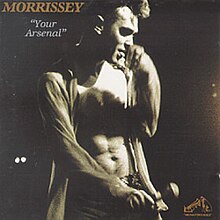I Know It's Gonna Happen Someday
| Your Arsenal | ||||
|---|---|---|---|---|
 |
||||
| Studio album by Morrissey | ||||
| Released | 27 July 1992 | |||
| Recorded | February 1992 at Utopia Studios, Primrose Hill; March 1992 at The Wool Hall, Bath, England | |||
| Genre | ||||
| Length | 39:45 | |||
| Label | HMV | |||
| Producer | Mick Ronson | |||
| Morrissey chronology | ||||
|
||||
| Singles from Your Arsenal | ||||
|
||||
| Professional ratings | |
|---|---|
| Review scores | |
| Source | Rating |
| AllMusic | |
| Blender | |
| Entertainment Weekly | A− |
| Los Angeles Times | |
| NME | 7/10 |
| Pitchfork | 7.3/10 |
| Q | |
| Rolling Stone | |
| The Rolling Stone Album Guide | |
| The Village Voice | A− |
Your Arsenal is the third studio album by English singer Morrissey, released on 27 July 1992 by record label HMV.
The album received critical acclaim and reached number 4 on the UK Albums Chart.
Morrissey had been rehearsing with a new band prior to the release of Your Arsenal, which was the first official album of this new line-up, whose core has remained stable to date (since this record was released, his music has been chiefly composed by either Alain Whyte or Boz Boorer, two musicians originally coming from the rockabilly scene).
Commencing with "You're Gonna Need Someone on Your Side", the album represents a clear change in direction for Morrissey from indie pop to a more muscular rock sound; with some elements of rockabilly. It also contains a glam rock influence, due to the involvement of ex-David Bowie guitarist Mick Ronson. Songs such as "Certain People I Know", "Glamorous Glue" and "I Know It's Gonna Happen Someday", which are respectively influenced by T. Rex, and David Bowie's Ziggy Stardust period songs (e.g. "The Jean Genie" and the latter by "Rock 'n' Roll Suicide"). David Bowie later covered the track "I Know It's Gonna Happen Someday" on his 1993 album Black Tie White Noise.
Some tracks from the album were lyrically controversial, although much of the controversy was generated by the New Musical Express, who had turned against Morrissey by this time. "Glamorous Glue", though a personally conflicted and ambivalent song, was accused of anti-Americanism, while the similarly ambiguous "We'll Let You Know" was accused of defending football hooliganism. "The National Front Disco", meanwhile, was accused by some of glorifying the British National Front, a far-right group, and the ambiguity of lyrics such as "England for the English" was criticised.
...
Wikipedia
